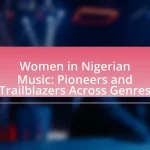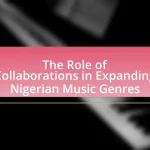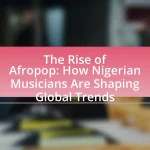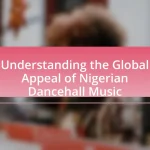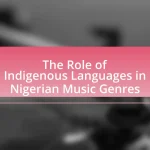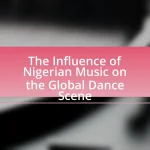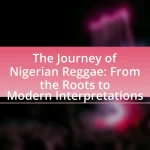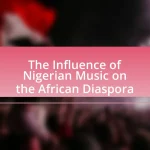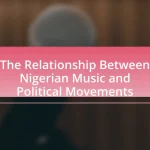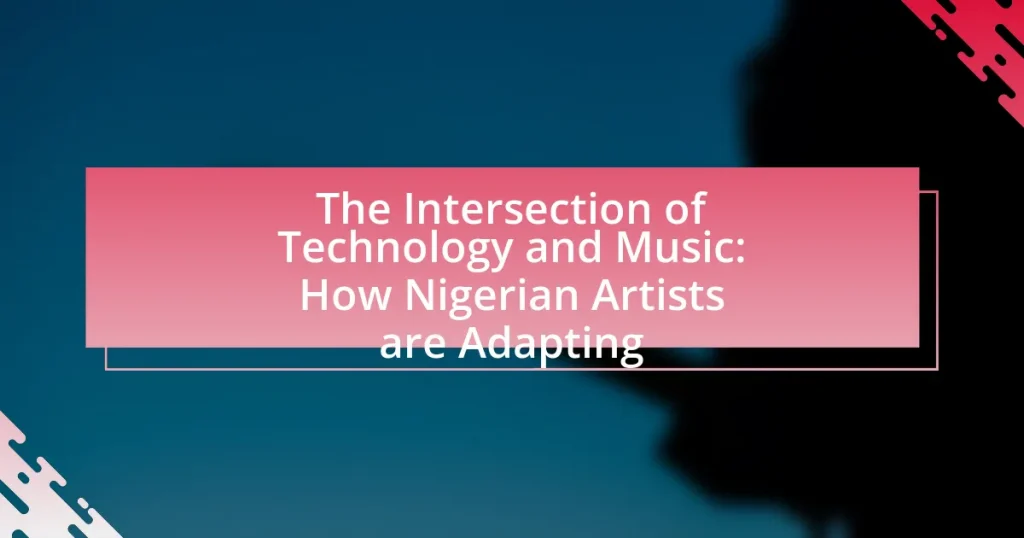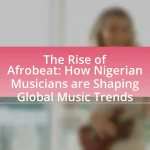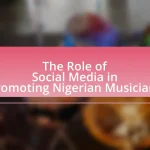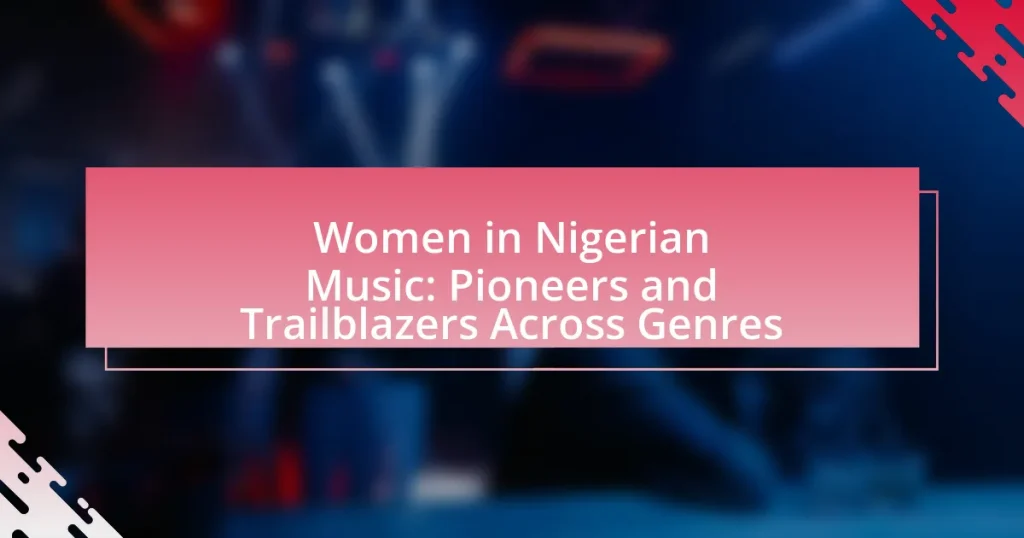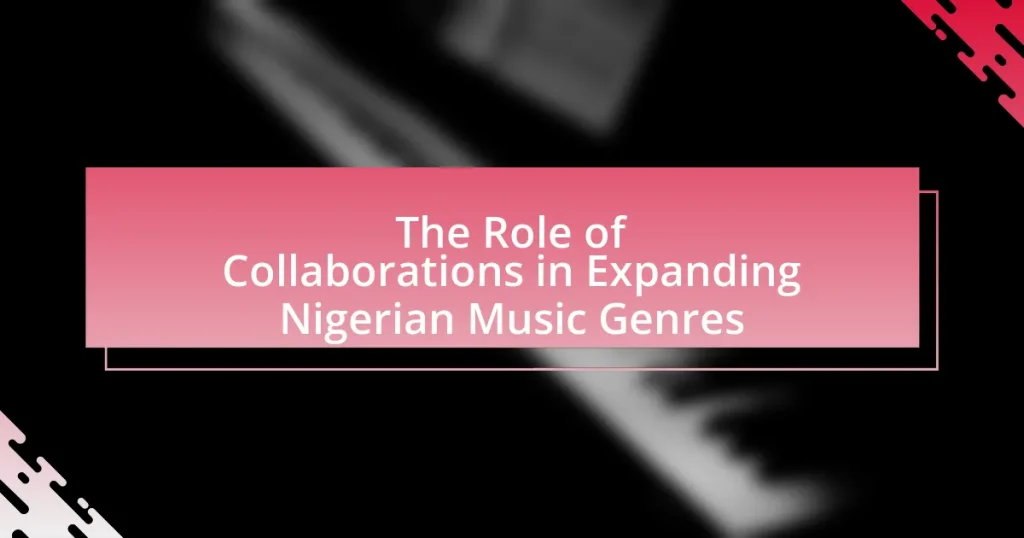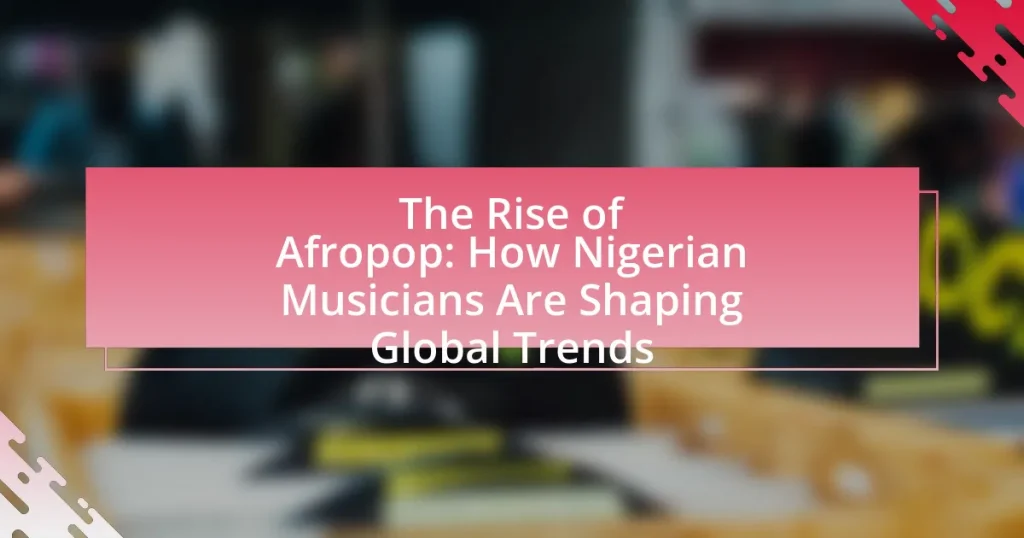The article examines the intersection of technology and music in Nigeria, highlighting how digital platforms, social media, and advanced production techniques are transforming the music industry. It discusses the significant impact of streaming services like Spotify and Apple Music on artists’ global reach and revenue, as well as the role of social media in promoting music and engaging with fans. Additionally, the article addresses the challenges Nigerian artists face in adapting to new technologies, the benefits of music production software, and innovative marketing strategies that enhance visibility and market reach. Overall, it underscores the importance of technological adaptation for the growth and competitiveness of Nigerian music on the global stage.
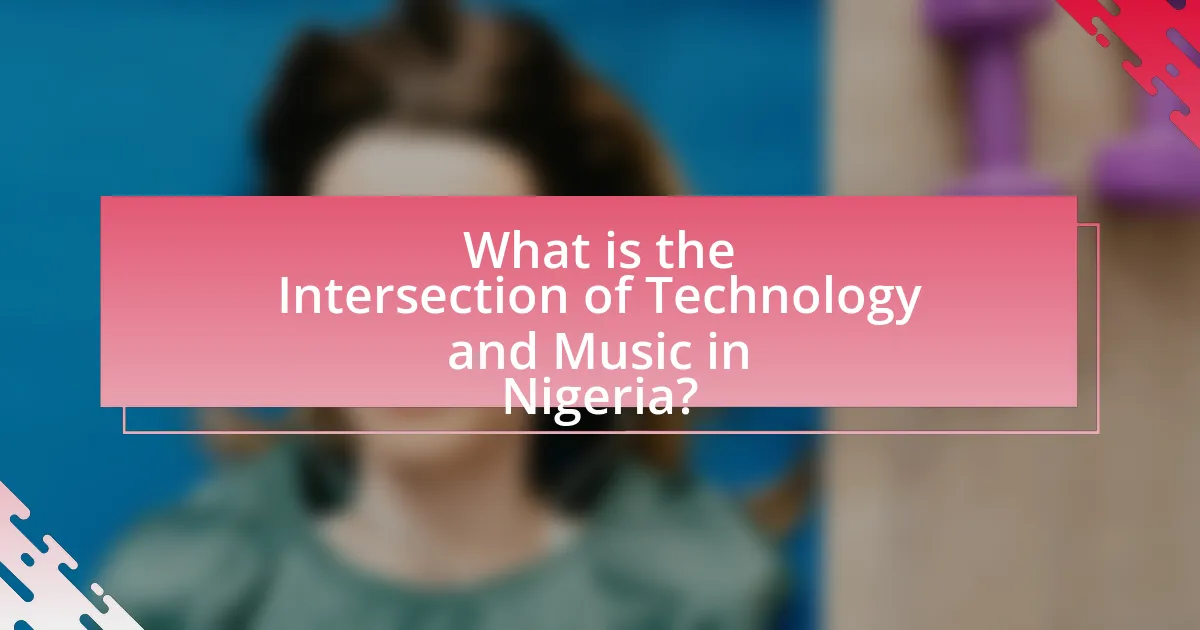
What is the Intersection of Technology and Music in Nigeria?
The intersection of technology and music in Nigeria is characterized by the integration of digital platforms, social media, and innovative production techniques that enhance music distribution and consumption. Nigerian artists leverage streaming services like Spotify and Apple Music, which have significantly increased their global reach and audience engagement. Additionally, the rise of social media platforms such as Instagram and TikTok allows artists to promote their music directly to fans, facilitating viral trends and collaborations. According to a report by the International Federation of the Phonographic Industry (IFPI), Nigeria’s music industry has seen substantial growth, with digital revenues contributing to over 50% of total music sales in recent years, underscoring the critical role of technology in transforming the music landscape.
How has technology influenced the music industry in Nigeria?
Technology has significantly influenced the music industry in Nigeria by enabling artists to produce, distribute, and promote their music more efficiently. The rise of digital platforms such as Spotify, Apple Music, and local services like Boomplay has allowed Nigerian musicians to reach global audiences, increasing their visibility and revenue potential. Additionally, social media platforms like Instagram and TikTok have transformed how artists engage with fans, facilitating viral marketing and direct interaction. According to the International Federation of the Phonographic Industry (IFPI), Nigeria’s music market grew by 25% in 2020, largely driven by digital sales and streaming, highlighting the critical role of technology in this transformation.
What technological advancements have been most impactful for Nigerian artists?
The most impactful technological advancements for Nigerian artists include digital distribution platforms, social media, and music production software. Digital distribution platforms like Spotify and Apple Music have enabled artists to reach global audiences, significantly increasing their visibility and revenue potential. Social media platforms such as Instagram and Twitter allow artists to engage directly with fans, promote their work, and build personal brands, which is crucial in the competitive music industry. Additionally, advancements in music production software, such as Ableton Live and FL Studio, have democratized music creation, allowing artists to produce high-quality music from home studios without the need for expensive recording facilities. These technologies have collectively transformed the landscape for Nigerian artists, facilitating greater creativity, accessibility, and market reach.
How do these advancements change the way music is produced and consumed?
Advancements in technology significantly alter music production and consumption by enabling greater accessibility and efficiency. Digital audio workstations (DAWs) allow artists to produce high-quality music from home studios, reducing the need for expensive studio time. Additionally, streaming platforms like Spotify and Apple Music democratize music distribution, allowing artists to reach global audiences without traditional record label support. According to the International Federation of the Phonographic Industry (IFPI), streaming accounted for 62% of global recorded music revenue in 2020, illustrating the shift in consumption habits. These changes empower Nigerian artists to innovate and connect with listeners worldwide, reflecting a broader trend in the music industry.
Why is it important for Nigerian artists to adapt to technological changes?
It is important for Nigerian artists to adapt to technological changes to enhance their reach and engagement with global audiences. The rise of digital platforms, such as streaming services and social media, has transformed how music is distributed and consumed, allowing artists to connect with fans worldwide. For instance, in 2020, Nigerian music streaming saw a significant increase, with platforms like Spotify reporting a 50% growth in Nigerian playlists. This adaptation not only increases visibility but also opens up new revenue streams through digital sales and online performances, crucial for sustaining their careers in a competitive industry.
What challenges do Nigerian artists face in adapting to new technologies?
Nigerian artists face several challenges in adapting to new technologies, primarily including limited access to high-speed internet, inadequate infrastructure, and a lack of digital literacy. Limited access to high-speed internet restricts artists from utilizing online platforms for distribution and promotion, which is crucial in today’s digital music landscape. Inadequate infrastructure, such as unreliable power supply, hampers the ability to create and produce music using advanced technology. Additionally, a lack of digital literacy among some artists prevents them from fully leveraging tools like social media and music production software, which are essential for reaching wider audiences and enhancing their craft. These challenges collectively hinder the growth and global competitiveness of Nigerian artists in the evolving music industry.
How does adaptation to technology affect the global reach of Nigerian music?
Adaptation to technology significantly enhances the global reach of Nigerian music by facilitating distribution and audience engagement. Digital platforms like Spotify, Apple Music, and YouTube allow Nigerian artists to share their music worldwide, breaking geographical barriers. For instance, the rise of streaming services has led to a 25% increase in the consumption of Nigerian music globally between 2019 and 2021, according to the International Federation of the Phonographic Industry (IFPI). Additionally, social media platforms enable artists to connect directly with fans, promoting their work and expanding their listener base beyond Nigeria. This technological adaptation not only increases visibility but also fosters collaborations with international artists, further amplifying the global presence of Nigerian music.
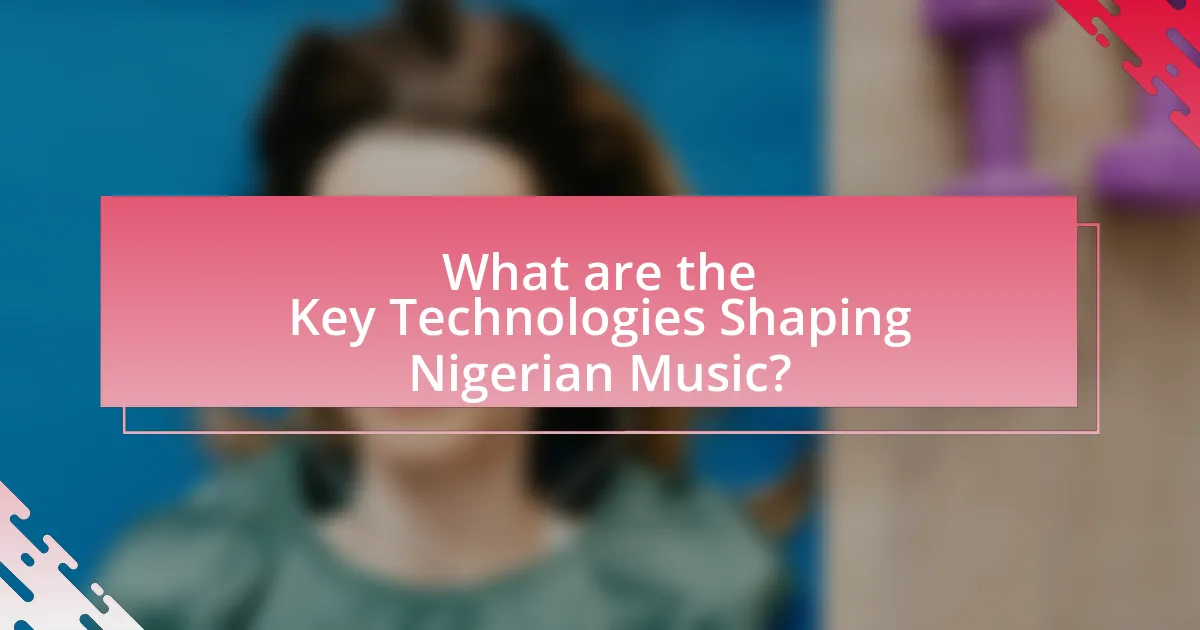
What are the Key Technologies Shaping Nigerian Music?
Key technologies shaping Nigerian music include digital audio workstations (DAWs), streaming platforms, and social media. Digital audio workstations like FL Studio and Ableton Live enable artists to produce high-quality music from home, significantly lowering production costs. Streaming platforms such as Spotify and Apple Music provide artists with global reach and revenue opportunities, with Nigerian music experiencing a surge in international popularity, evidenced by the rise of Afrobeats. Social media platforms like Instagram and TikTok facilitate direct engagement with fans and promote music virally, allowing artists to build their brands and reach wider audiences quickly. These technologies collectively transform how music is created, distributed, and consumed in Nigeria.
What role do digital platforms play in the distribution of Nigerian music?
Digital platforms are crucial in the distribution of Nigerian music by providing artists with direct access to global audiences. These platforms, such as Spotify, Apple Music, and YouTube, enable Nigerian musicians to upload and share their music without the need for traditional record labels, thus democratizing the music distribution process. According to a report by the International Federation of the Phonographic Industry (IFPI), digital music revenues in Nigeria grew by 25% in 2020, highlighting the increasing reliance on these platforms for music consumption. This shift allows artists to retain more control over their work and reach listeners worldwide, significantly impacting the growth and visibility of Nigerian music on the international stage.
How do streaming services impact the revenue of Nigerian artists?
Streaming services significantly enhance the revenue of Nigerian artists by providing broader access to their music and facilitating monetization through streaming royalties. As of 2023, platforms like Spotify and Apple Music have expanded their presence in Nigeria, allowing artists to reach global audiences, which increases their potential earnings. For instance, a report from the International Federation of the Phonographic Industry (IFPI) indicates that digital music revenues in Nigeria grew by 25% in 2022, largely driven by streaming. This growth reflects the shift from traditional sales to digital consumption, enabling artists to earn from both local and international listeners.
What are the benefits of social media for promoting Nigerian music?
Social media significantly enhances the promotion of Nigerian music by providing artists with direct access to a global audience. This platform allows musicians to share their work instantly, engage with fans, and build a personal brand without the need for traditional media gatekeepers. For instance, Nigerian artists like Burna Boy and Wizkid have leveraged platforms such as Instagram and Twitter to reach millions, resulting in increased streaming numbers and international collaborations. Additionally, social media facilitates viral marketing through user-generated content, enabling songs to gain traction quickly, as seen with the global success of “Jerusalema” by Master KG, which became a worldwide dance phenomenon largely due to social media sharing.
How are Nigerian artists utilizing music production software?
Nigerian artists are utilizing music production software to enhance their creative processes and streamline music production. They leverage digital audio workstations (DAWs) like FL Studio, Ableton Live, and Logic Pro to compose, record, and mix their music, allowing for greater experimentation and innovation. This adoption of technology has led to the emergence of diverse genres and sounds, contributing to the global popularity of Afrobeats and other Nigerian music styles. The accessibility of these software tools has empowered artists to produce high-quality music independently, reducing reliance on traditional recording studios and enabling them to reach wider audiences through digital platforms.
What are the most popular software tools among Nigerian musicians?
The most popular software tools among Nigerian musicians include FL Studio, Ableton Live, and Logic Pro. FL Studio is favored for its user-friendly interface and powerful features, making it a top choice for beat-making and music production. Ableton Live is renowned for its versatility in live performances and studio work, appealing to many artists in the Nigerian music scene. Logic Pro, while primarily used on Mac, is appreciated for its comprehensive suite of production tools and high-quality sound libraries. These tools are widely adopted due to their effectiveness in producing high-quality music, which is essential in the competitive Nigerian music industry.
How does technology enhance the creative process for artists?
Technology enhances the creative process for artists by providing innovative tools and platforms that facilitate artistic expression and collaboration. Digital software allows artists to experiment with various styles and techniques, enabling them to create complex works that may not be possible through traditional methods. For instance, music production software like Ableton Live and FL Studio offers features such as virtual instruments and sound manipulation, which expand the sonic possibilities for musicians. Additionally, online platforms enable artists to collaborate across geographical boundaries, fostering a diverse exchange of ideas and influences. Research indicates that 70% of artists report increased creativity due to access to digital tools, highlighting the significant impact of technology on artistic innovation.
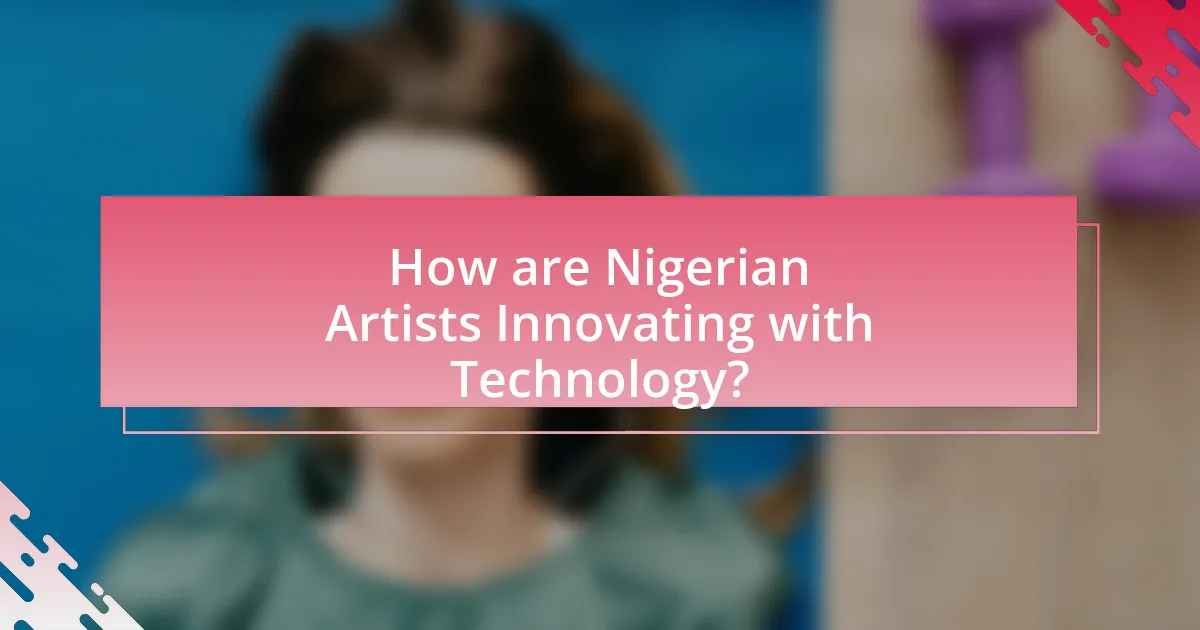
How are Nigerian Artists Innovating with Technology?
Nigerian artists are innovating with technology by integrating digital platforms for music distribution, utilizing social media for promotion, and adopting advanced production techniques. For instance, artists like Burna Boy and Wizkid leverage streaming services such as Spotify and Apple Music to reach global audiences, significantly increasing their visibility and revenue. Additionally, the use of social media platforms like Instagram and TikTok allows these artists to engage with fans directly and create viral content, enhancing their brand presence. Furthermore, many Nigerian musicians are employing cutting-edge software and hardware in music production, which has led to a unique fusion of traditional African sounds with contemporary genres, exemplified by the rise of Afrobeats. This technological adaptation not only broadens their creative possibilities but also positions them competitively in the global music industry.
What unique strategies are Nigerian artists employing to leverage technology?
Nigerian artists are employing unique strategies such as utilizing social media platforms for direct fan engagement, leveraging streaming services for global distribution, and incorporating digital tools for music production. By using platforms like Instagram and TikTok, artists can reach wider audiences and promote their music effectively, evidenced by the viral success of songs like “Jerusalema” by Master KG, which gained international traction through social media. Additionally, the rise of streaming services like Spotify and Apple Music has allowed Nigerian artists to distribute their music globally, increasing their revenue and visibility. Furthermore, many artists are adopting digital production software, enabling them to create high-quality music from home studios, which has become increasingly important during the COVID-19 pandemic. These strategies collectively enhance their market reach and adaptability in the evolving music landscape.
How are collaborations with tech companies influencing music creation?
Collaborations with tech companies are significantly influencing music creation by providing artists with advanced tools and platforms for production and distribution. For instance, partnerships with companies like Spotify and Apple Music enable Nigerian artists to reach global audiences, enhancing their visibility and marketability. Additionally, technology firms offer innovative software and hardware that streamline the music production process, allowing for higher quality sound and more creative possibilities. A notable example is the use of AI-driven music composition tools, which can assist artists in generating new ideas and sounds, thereby expanding their creative horizons. These collaborations not only facilitate access to cutting-edge technology but also foster a more dynamic and interconnected music ecosystem.
What innovative marketing techniques are being used by Nigerian artists?
Nigerian artists are utilizing innovative marketing techniques such as social media engagement, collaborations with influencers, and the use of digital streaming platforms. Social media platforms like Instagram and TikTok allow artists to reach wider audiences through viral content and direct interaction with fans. Collaborations with influencers amplify their reach, as these influencers promote the artists’ music to their established follower bases. Additionally, digital streaming platforms like Spotify and Apple Music provide artists with data analytics that help tailor marketing strategies based on listener preferences and behaviors, enhancing their promotional efforts. These techniques have been effective in increasing visibility and driving music sales in the competitive Nigerian music industry.
How can emerging artists in Nigeria effectively use technology?
Emerging artists in Nigeria can effectively use technology by leveraging social media platforms for promotion, utilizing digital distribution services for music release, and engaging with fans through interactive content. Social media platforms like Instagram and TikTok allow artists to reach a global audience, with statistics showing that over 50% of Nigerian internet users are active on these platforms, enhancing visibility and engagement. Digital distribution services such as DistroKid and TuneCore enable artists to release their music on major streaming platforms like Spotify and Apple Music, which have seen a significant increase in Nigerian content consumption, with a reported 30% growth in local music streams in the past year. Additionally, interactive content such as live streams and virtual concerts can foster a deeper connection with fans, as evidenced by the rise in online concert attendance during the pandemic, which provided artists with new revenue streams and audience engagement opportunities.
What resources are available for new artists to learn about music technology?
New artists can access various resources to learn about music technology, including online courses, tutorials, and community forums. Platforms like Coursera and Udemy offer structured courses on music production and technology, while YouTube hosts countless tutorials from experienced producers. Additionally, websites such as Sound on Sound and MusicTech provide articles and reviews that cover the latest technology trends in music. Community forums like Gearslutz and Reddit’s r/WeAreTheMusicMakers allow artists to engage with peers and experts, sharing knowledge and experiences. These resources collectively support new artists in navigating the evolving landscape of music technology.
What best practices should emerging artists follow to succeed in the digital landscape?
Emerging artists should focus on building a strong online presence to succeed in the digital landscape. This includes utilizing social media platforms effectively, engaging with their audience, and consistently sharing high-quality content. Research indicates that artists who actively engage with fans on platforms like Instagram and TikTok see a significant increase in their follower base and overall engagement, with TikTok alone generating over 1 billion monthly active users as of 2023. Additionally, artists should leverage digital distribution services to ensure their music is available on major streaming platforms, as data shows that over 80% of music consumption now occurs through streaming. Collaborating with other artists and influencers can also enhance visibility and reach, as partnerships often lead to cross-promotion and access to new audiences.
